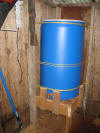


Emergency Water Storage
Yeah, I know, this is not an electronics related project, but it is 'emergency preparedness', which is close enough. I live about a half mile from a major earthquake fault line, so emergency preparedness is a significant issue for us.
The way I see it, we need three types of water in an emergency - drinking, washing and flushing. The last is easy - there is a small lake a quarter mile away and I can dip it out in five gallon buckets. I keep a significant amount of drinking water in five gallon poly jugs. I decided to build a rain barrel for wash water, but things got complicated in a hurry. There are all sorts of plans on the web for rain barrels, but they require diverters, overflows and all sorts of other stuff. A trip to my roof made me decide against a rain barrel - pigeons like to roost on my three element Yagi, and one end of the roof collects significant amounts of bird poop!
This put me to thinking - why store water that is not potable? I found a source for sixty gallon poly drums on Craigslist at a reasonable price. They were used to store a food grade surfactant, so it is safe for drinking water storage. The one I purchased has a removable top which makes it easy to clean and to mount a spigot.
I used a hole saw to cut a hole in the side of the drum about three inches from the bottom. A water spigot, a union, a 'close' half inch nipple, two large stainless steel washers and two large rubber washers made for a secure installation. Note that the spigot is mounted high enough to clear the deck which leaves some space in the bottom of the drum for sediment. I used scrap lumber for the stand, so I have about $30 into this project.
| October 9, 2017 update. I goofed on this installation and used a galvanized half inch nipple and a union to secure it and they rusted. This was not toxic, but the first water out of the drum was badly discolored with rust. I replaced them with brass fittings and all is well. This time I used food grade silicone sealant under the gaskets. When I first installed this tank I changed the water every three months. I am now changing it every six months and it is still sweet with no signs of algae and odor. The city water is chlorinated. I have two friends that are not on city water and they have had algae problems with the RVs, so I suggest that you chlorinate the water for storage if you are on well water. |
(Click on the thumbnails to enlarge them)